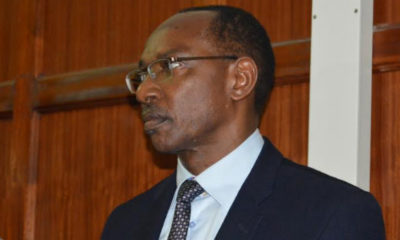Business
Humphrey Kariuki: The Kenyan Billionaire Who Lost State Privileges After Alleged Multibillion Tax Evasion

In the corridors of power in Kenya, few names have oscillated between privilege and peril as dramatically as Humphrey Kariuki Ndegwa.
The billionaire businessman, once a regular host to presidents and cabinet ministers at his luxury Mt. Kenya Safari Club, has witnessed his empire crumble under the weight of a protracted battle with Kenya’s tax authorities—a fight that cost him billions and nearly destroyed his reputation.
Today, as his flagship liquor company Africa Spirits Limited (ASL) enters administration, Kariuki’s story serves as a cautionary tale about the intersection of wealth, politics, and tax compliance in Kenya’s evolving business landscape.
The Rise of a Business Empire
Humphrey Kariuki’s journey from a Central Bank of Kenya employee to one of East Africa’s most influential businessmen reads like a modern African success story.
The founder of Janus Continental Group brought together several companies in the petroleum, energy, hospitality and real estate sectors, employing over 700 people in more than 10 countries across East, Central and Southern Africa, and the United Arab Emirates.
His crown jewel, the Mt. Kenya Safari Club in Nanyuki, has hosted illustrious guests including former British Prime Minister Winston Churchill and American singer Bing Crosby.
The 4.5-star establishment, spanning over 100 acres, became synonymous with power and prestige in Kenya’s political circles.
The Sh41 Billion Tax Bombshell
Everything changed on January 2019 when the Kenya Revenue Authority (KRA) conducted a dramatic raid on Africa Spirits Limited’s Thika-based factory.
The taxman accused the company of large-scale tax evasion through the use of fake excise stamps and failure to declare the full volume of alcohol produced and sold.
By August 19, 2019, the Directorate of Criminal Investigations had seized Kariuki himself, driving him to their Kiambu Road headquarters in what became one of Kenya’s most high-profile tax evasion cases.
The businessman was ordered to deposit Sh11 million cash bail to secure his freedom, facing accusations of evading Sh41 billion in taxes.
The charges were severe: tax fraud, possession of counterfeit excise stamps, and being in possession of uncustomed goods. ASL’s factory, which produced popular brands including Bluemoon vodka, Legend Brandy, Furaha Vodka, and Gypsy King Gin, was shuttered, effectively crippling Kariuki’s liquor empire.
Political Crossfire and Strategic Gambles
Sources close to the matter suggest that Kariuki’s troubles were partly political.
During President Uhuru Kenyatta’s administration, the businessman had reportedly found himself on the wrong side of power dynamics due to his alleged support for then-Deputy President William Ruto ahead of the 2022 general elections.
In a risky political gamble, Kariuki chose to align himself with Ruto’s presidential ambitions while Kenyatta’s administration intensified its crackdown on tax evaders.
The decision would prove both costly and ultimately rewarding, but not before years of legal battles and financial hemorrhaging.
In 2020, Kariuki briefly fled the country before returning to face the charges.
His legal team consistently argued that the accusations were politically motivated and based on flawed audits, though court proceedings continued intermittently with the company unable to resume full operations.
The Ruto Dividend
Kariuki’s strategic patience paid off when William Ruto won the presidency in August 2022.
Among Ruto’s first acts was ordering KRA to release the Thika-based distillery back to Kariuki in December 2022.
The handover took place just days after newly elected President William Ruto appointed Mr Kariuki and 11 other private sector leaders as members of the National Investment Council—a body that advises the government and its agencies on ways to increase investment and economic growth.
The symbolism was unmistakable.
In January 2023, President Ruto, Deputy President Rigathi Gachagua, and the entire cabinet held their retreat at Kariuki’s Mt. Kenya Safari Club—the same venue that had hosted similar retreats during Kenyatta’s first term when Kariuki was in the government’s good books.
The acquittal came in December 2022 when a Nairobi court cleared the billionaire in a case where he was charged with possession of 80 drums of uncustomed ethanol worth Sh7.4 million.
It seemed Kariuki’s costly gamble had finally paid off.
The Ownership Controversy
However, recent investigations have raised questions about media narratives surrounding Kariuki’s connection to Africa Spirits Limited.
A detailed examination of corporate records by Soko Directory (which we can’t independently confirm) revealed a startling claim: Humphrey Kariuki does not actually own Africa Spirits Limited and never has.
According to their investigation, Kariuki’s name does not appear in the CR12—the official document listing shareholders and directors.
ASL reportedly has nine directors, none of whom is Humphrey Kariuki.
The investigation found no evidence of share ownership, board positions, or executive authority within the company.
This revelation, if accurate, suggests that years of media coverage linking Kariuki directly to ASL may have been based on assumptions rather than corporate reality.
The persistence of this narrative raises questions about the accuracy of business reporting in Kenya’s media landscape.
The Final Collapse
Despite the political rehabilitation, ASL’s financial troubles proved insurmountable.
The liquor company has been placed under administration by its directors, nearly six years after the KRA raid crippled operations at its Thika factory.
The directors appointed Peter Kahi of PKF Consulting Limited as administrator.
The administration notice, published on June 20, 2025, grants Kahi full control over the company’s assets and operations.
All powers of directors, shareholders, and staff in handling the firm’s finances have ceased unless explicitly authorized by the administrator.
Creditors have until July 18, 2025, to submit claims against the company.
Sources suggest the liquor business is unlikely to reopen.
“The company has remained shut for a long time and reopening it is an unlikely option because of the mega resources it would require to do so,” an official said.
Peter Kahi, who has overseen the administration of high-profile corporate collapses including Nakumatt Supermarkets and Mumias Sugar Company, faces the challenging task of assessing ASL’s financial position and potentially restructuring the business to avoid liquidation.
Legacy of a Cautionary Tale
Humphrey Kariuki’s story illustrates the volatile relationship between wealth, politics, and regulatory compliance in Kenya.
His ability to weather the storm through strategic political positioning demonstrates the enduring influence of personal relationships in Kenya’s business environment.
However, the ultimate collapse of ASL, regardless of ownership structure, highlights the devastating long-term impact of regulatory disputes on business operations.
The six-year closure of the Thika factory, combined with ongoing legal uncertainties, created insurmountable operational and financial challenges.
As ASL enters administration, questions remain about the future of Kariuki’s broader business empire.
While his hospitality and energy interests continue to operate, the liquor company’s collapse serves as a reminder that even the most well-connected businessmen are not immune to the consequences of regulatory non-compliance.
For Kenya’s business community, Kariuki’s journey from kingmaker to outcast and back to presidential advisor—only to see his flagship company collapse—offers sobering lessons about the risks of operating in the gray areas between business and politics.
The final chapter of the Africa Spirits Limited saga now rests in the hands of administrators and creditors.
Whether any value can be salvaged from the ruins of what was once one of Kenya’s prominent liquor companies remains to be seen.
What is certain is that Humphrey Kariuki’s reputation as an untouchable business mogul has been forever altered by this protracted battle with Kenya’s tax authorities.
As investigations continue and legal proceedings unfold, the Kariuki case stands as a landmark example of how quickly fortunes can change in Kenya’s high-stakes business environment, where political connections, while valuable, cannot always shield enterprises from the consequences of regulatory disputes.
Kenya Insights allows guest blogging, if you want to be published on Kenya’s most authoritative and accurate blog, have an expose, news TIPS, story angles, human interest stories, drop us an email on [email protected] or via Telegram
-

 Grapevine1 week ago
Grapevine1 week agoAlleged Male Lover Claims His Life Is in Danger, Leaks Screenshots and Private Videos Linking SportPesa CEO Ronald Karauri
-

 Lifestyle1 week ago
Lifestyle1 week agoThe General’s Fall: From Barracks To Bankruptcy As Illness Ravages Karangi’s Memory And Empire
-

 Grapevine3 days ago
Grapevine3 days agoRussian Man’s Secret Sex Recordings Ignite Fury as Questions Mount Over Consent and Easy Pick-Ups in Nairobi
-

 Investigations2 weeks ago
Investigations2 weeks agoEpstein Files: Sultan bin Sulayem Bragged on His Closeness to President Uhuru Then His Firm DP World Controversially Won Port Construction in Kenya, Tanzania
-

 News2 weeks ago
News2 weeks agoAUDIT EXPOSES INEQUALITY IN STAREHE SCHOOLS: PARENTS BLED DRY AS FEES HIT Sh300,000 AGAINST Sh67,244 CAP
-

 Business2 weeks ago
Business2 weeks agoKRA Can Now Tax Unexplained Bank Deposits
-

 Investigations1 week ago
Investigations1 week agoEpstein’s Girlfriend Ghislaine Maxwell Frequently Visited Kenya As Files Reveal Local Secret Links With The Underage Sex Trafficking Ring
-

 News1 week ago
News1 week agoState Agency Exposes Five Top Names Linked To Poor Building Approvals In Nairobi, Recommends Dismissal After City Hall Probe



























